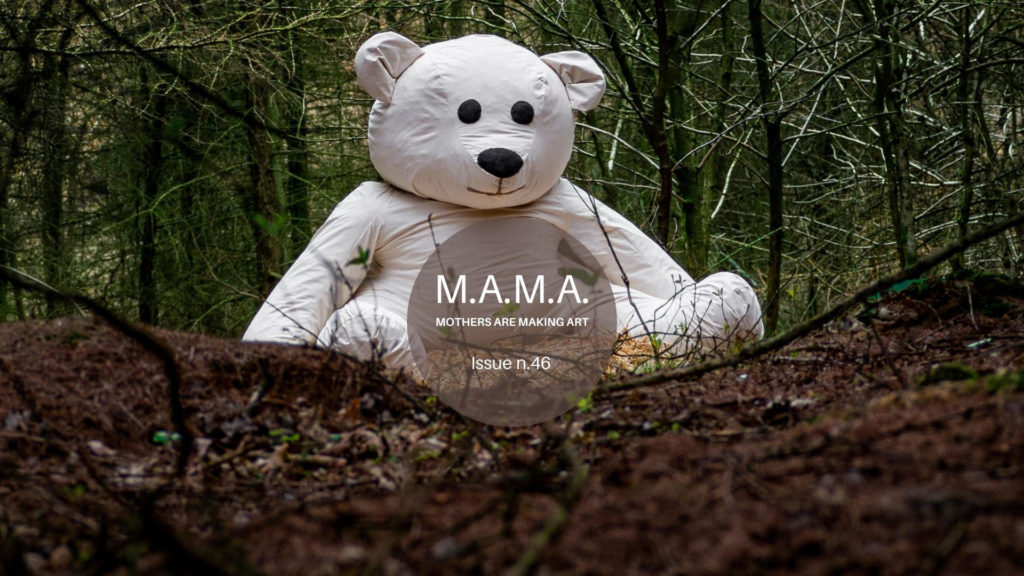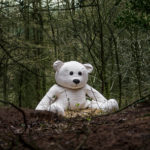M.A.M.A. 46: Christina Kolaiti and Melisa Cahnmann-Taylor
The Procreate Project, the Museum of Motherhood and the Mom Egg Review, partners for an on-line publication platform featuring art, academic and creative writing with the aim to promote women internationally and generate cultural exchanges and opportunities.
Poetry by Melisa Cahnmann-Taylor
Home Isolation, Day 42
It smells of boy funk, dog,
and morning breath.
When I ask: Do you need any help?
I mean tornados, fractions, conjugations but I also mean interrogations of the gentler kind:
How are you doing? What do you miss? How can I substitute for your losses?
A dirty sock, whirring
laptop, abandoned
saxophone case-less, exposed,
today put nothing away.
Melisa Cahnmann-Taylor, Professor of Language and Literacy Education at the University of Georgia, is the author of Imperfect Tense (poems), and three scholarly books in education. Winner of NEA Big Read Grants, the Beckman award for Professors Who Inspire, and a Fulbright for nine-month study of adult Spanish language acquisition in Oaxaca Mexico, she’s served for over ten years as poetry editor for Anthropology & Humanism, judging the ethnographic poetry competition. She blogs at http:// teachersactup.com.
Three Degrees of Separation
by Dr Christina Kolaiti
This body of research challenges the conflicting landscape of early motherhood, as this is conveyed through social prescriptions, which interpret the body as a metaphor for self-worth and aim at controlling the mother-infant physicality. This norm is in fact experienced through three progressive stages of physical and emotional separation between mother and infant, opposing the fundamental principles of healthy attachment i and can result in breastfeeding grief, separation anxiety and trauma.
Early weaning, the cot-centred sleep training culture and the introduction of the infant to day care are three progressive stages of physical separation. Such conventions discourage “interdependence with high parental contact” ii and define three modes of cry it out iii experienced mutually by the infant and also, the mother. This body of research holds an opposing view and strives towards a more natural approach to the mother-infant relationship through maximised physical closeness in both daytime and night-time parenting practices.
Three Degrees of Separation
Installation by Christina Kolaiti at SelfScapes 2021, Dalby Forest iv
The installation presented at Dalby Forest during SelfScapes 2021v reveals the social construct of separateness as a misleading connotation of independence, which is exposed by the disturbing melancholy of the aloneness of the cherished handmade teddy bear.
If unattended long enough, babies stop crying because “they are simply giving up on the hope that comfort will come.” vi Vulnerable to the wilderness of the forest, the solitary presence of the delicate milk-coloured teddy bear, signified an unexpected encounter for the walkers. Yet, the bear is not alone.
This sighting (the infant-mother teddy bear) provoked an affectionate response from people who began to share images of keeping the bear company and temporarily making it part of their family. It was as if this natural encounter with separateness “reawakened a deeply instinctive way” of relating, or in other words parenting ” […] as nature intended: a true source of contact, security and warmth […].” vii
The walker’s portraits show an unplanned demonstration that secure attachment is as much nurtured in the physiological infant-mother closeness, as are the social aspects of this relationship. viii Likewise, this substantiates that co-nurturing interdependence is as much a responsibility of the prime caregiver as it is epitomised by communal affairs, representing a “lasting psychological connectedness between human beings.” ix By embracing our innate instincts, we can collectively re-instate the balance between intuition and convention.
It takes a village to raise a child. x
i Bowlby, J. (1969) Attachment. Attachment and loss: Vol. 1. Loss. New York: Basic Books.
ii McKenna, J. J. (1996) ‘Babies Need Their Mothers Beside Them’, The Natural Child Project. Available at https://www.naturalchild.org/articles/james_mckenna/babies_need.html
iii Burbridge, A. (2016) ‘Letting babies cry-the facts behind the scenes’, La Leche League GB. Available at: laleche.org.uk.
iv Installation by Christina Kolaiti (2021), in SelfScapes [exhibition], Dalby Forest. Available at: https://selfscapes.wixsite.com/selfscapes. Image by Megan Curtis, post-production Paul Spillett.
v SelfScapes is an arts initiative, which explores the relationship between the self and the natural environment. Dalby Forest, March-June 2021. The project is supported by The Arts Council England and Forestry England.
vi Burbridge, A. [Ibid.]
vii Maté, D. G., Neufeld, G., (2019). Hold on to your kids: Why parents need to matter more than peers. United Kingdom: Ebury Publishing.
viii McKenna, J.J. [Ibid.]
ix (Bowlby,1969:94).
x African proverb, which proposes parenting as a communal responsibili
See more at ProCreate Project
Dr Christina Kolaiti is a Senior Lecturer in Photography at York St John University. She is a visual artist whose research has been based on interdisciplinary collaborations with healthcare institutions. For over a decade Kolaiti’s research activity has positioned the narrative properties of fine art photography within a diverse range of scientific and pedagogical contexts.Her research profile includes exhibitions set within various hospital sites (for example, The Northern Surgery Skills Institute at Hexham General Hospital and The Royal College of Physicians in London). She has received research awards by The Arts and Humanities Research Council, The Arts Council England, York St John University and most notably, The Combined Royal Photographic Society and Royal Medical Colleges Medal in 2011, ‘[…] for an outstanding contribution to the advancement of the art and science of photography.’ (rps.org)




